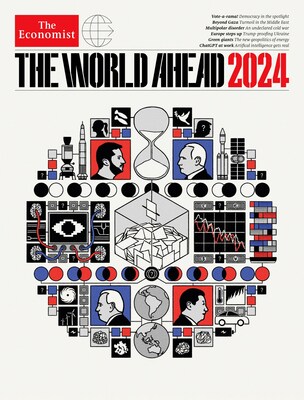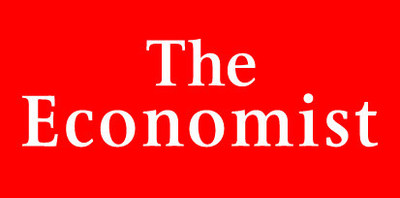2024 will put a spotlight on the global state of democracy as more people than ever head to the polls
Press Releases
Nov 14, 2023
The Economist’s World Ahead 2024 launches this week, featuring future-gazing content from The Economist’s editorial team and global contributors
LONDON, Nov. 14, 2023 /PRNewswire/ — The Economist has launched The World Ahead, an annual special year-end issue from The Economist that examines important themes, trends and events that will shape the coming year. The editor’s top ten themes for 2024 and the accompanying articles are online today on https://www.economist.com/the-world-ahead-2024. The full edition will be available digitally from November 16th, and, for the first time, included in The Economist‘s weekly print edition dated November 18th. The standalone print issue will be available on global newsstands from November 29th (later in the United States due to the Thanksgiving holiday).
Commenting on this year’s edition of The World Ahead, its editor Tom Standage said, “Life comes at you fast. Whether it’s the upsurge in armed conflict, the redrawing of the global energy resources map or rapid progress in artificial intelligence, the world is changing at mind-boggling speed. From the situation in the Middle East to the adoption of electric vehicles to the treatment of obesity, things look very different from the way they did just a year or two ago. The World Ahead‘s aim is to help you keep your worldview up to date—and tell you what might be coming next.”
The World Ahead discusses a broad range of topics, but its top ten themes for 2024, distilled from its pages, are as follows:
- Votearama! Elections all over the world, for more voters than ever before, will put a spotlight on the global state of democracy. There will be more than 70 elections in 2024 in countries that are home to around 4.2bn people—for the first time, more than half of the global population. But while there is more voting than ever, there is not necessarily more democracy: many elections will be neither free nor fair.
- America’s global choice. Voters, and the courts, will give their verdicts on Donald Trump, who has a one in three chance of regaining the presidency. The result may come down to a few tens of thousands of voters in a handful of swing states. But the consequences will be global, affecting everything from climate policy to military support for Ukraine. Indeed, election rigging in Russia may mean Vladimir Putin’s fate depends more on American voters than Russian ones.
- Step up, Europe. Accordingly, Europe must step up and provide Ukraine with the military and economic backing needed for a long fight, while laying out a path towards eventual EU membership. This is the right thing to do, as well as insuring against the risk that Mr Trump regains power and withdraws support.
- Middle East turmoil. Hamas’s attack on Israel, and Israel’s retaliation against Gaza, have upended the region and scotched the idea that the world could continue to ignore the Palestinians’ plight. Will it become a wider regional conflict—or offer a new chance for peace? For America, the overstretched superpower, this is also a test of whether it can adapt to a more complex and threatening world.
- Multipolar disorder. America’s plan to pivot to Asia, and focus more on its rivalry with a rising China, has been derailed by war in Ukraine and now Gaza. Russia, too, is distracted and losing influence. Frozen conflicts are thawing and local cold wars are heating up around the world. Instability in the Sahel is rising. The world is preparing for more conflict now that America’s “unipolar moment” has ended.
- A second cold war. As China’s growth has slowed, tensions rise over Taiwan, and America continues to limit Chinese access to advanced technologies, the “new cold war” rhetoric has hardened. But Western companies trying to reduce their supply chains’ dependency on China will find it much easier said than done. Meanwhile both camps will woo the “middle powers” of the global south, not least for their green resources.
- New energy geography. The clean energy transition is minting new green superpowers and redrawing the energy resources map. Lithium, copper and nickel matter much more, while oil and gas, and the regions that dominate their supply, matter less. Competition for green resources is reshaping geopolitics and trade, and creating some unexpected winners and losers. Meanwhile, a “greenlash” is under way among voters who regard climate friendly policies as an elite conspiracy against ordinary people.
- Economic uncertainty. Western economies did better than expected in 2023 but are not out of the woods yet, and interest rates staying “higher, for longer” will be painful for companies and consumers alike, even if recessions are avoided. (Keep an eye on the banks, and their exposure to commercial property, where things could go bad.) China may fall into deflation.
- AI gets real. Businesses are adopting it, regulators are regulating it and techies continue to improve it. Debate will intensify over the best regulatory approach—and whether arguments over “existential risk” are a decoy that benefits incumbents. Unexpected uses and abuses will keep popping up. Worries abound about AI’s effect on jobs and potential for election meddling. Its biggest actual impact? Faster coding.
- Uniting the world? Perhaps ideological differences will be put aside as the world enjoys the Paris Olympics, astronauts (maybe) looping around the Moon, and the men’s T20 cricket World Cup. But it is just as likely that those hoping for some global unity will be stumped.
The Economist‘s journalists are joined in The World Ahead 2024 by leaders from business, politics, science and the arts, who add their ideas for the coming year: Niall Ferguson and Condoleezza Rice of Stanford’s Hoover Institution; Subrahmanyam Jaishankar, minister of external affairs, India; Dara Massicot, senior policy researcher, Carnegie Endowment; Rachel Reeves, Labour MP and shadow chancellor; Timnit Gebru, AI researcher and founder, DAIR; and Jennifer Holmgren, chief executive, LanzaTech.
About The Economist (economist.com)
With rigorous reporting, in-depth analysis and global perspective, The Economist explains today’s most important events and discerns the trends that will shape tomorrow. In addition to the weekly print edition, The Economist publishes its journalism daily through its website, app, podcasts, 15 newsletters, short- and long-form video and Espresso, an app with concise stories on global news. The Economist has 1.2 million subscribers. More than 60m people follow The Economist across X (formerly Twitter), Facebook, Instagram, YouTube, LinkedIn, TikTok and Threads.
![]() View original content to download multimedia:https://www.prnewswire.com/news-releases/2024-will-put-a-spotlight-on-the-global-state-of-democracy-as-more-people-than-ever-head-to-the-polls-301986682.html
View original content to download multimedia:https://www.prnewswire.com/news-releases/2024-will-put-a-spotlight-on-the-global-state-of-democracy-as-more-people-than-ever-head-to-the-polls-301986682.html
SOURCE The Economist





